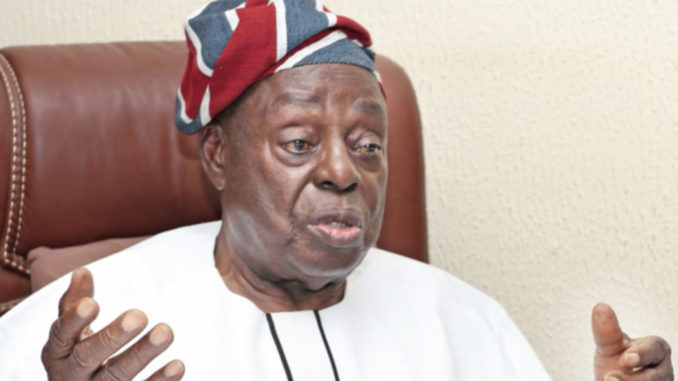
Since the colonial days, Ekiti State has been landlocked, airport-locked, railwaylocked, industrylocked and powerlocked, a development that has adversely affected the economic development of the state. Conversely, most of the other states in the country have well built dual-carriage roads, airports and railway lines.
Ekiti, with a total land mass of 6,353 square kilometres (2,453 square miles), and a population of 2,398,957 (2006 census), came into being 22 years ago. It is the sixth smallest state in the country with Abia (6,320 square kilometres), Ebonyi (5,670 square kilometres), Imo (5,530 square kilometres), Anambra (4,844 square kilometres) and Lagos (3,345 square kilometres) queuing after it in that order.
Interestingly, each of the four federal roads leading to Ado-Ekiti, the state capital, is not more than 30 miles from the town itself.
Constructed by the British colonial administrators over 100 years ago, the four roads also pass through Ado-Ekiti, linking the state with Osun, Kwara, Kogi and Ondo States.
The first road stretches from Ado-Ekiti to Otun and Kwara State, while the second one is from Ado-Ekiti through Effon-Alaye to Ilesa in the Old Oyo Province.
The third road also stretches from Ado-Ekiti through Ikere-Ekiti to Akure in Ondo State and the fourth one is from Ado-Ekiti to Ijan, Iluomoba, Ode, to Lokoja in Kogi State.
The tragedy is that all the four federal roads, which have been serially neglected by successive central governments, have since become impassable death-traps. This has forced many users of these failed federal roads to navigate their way through bush paths to get to their various destinations.
Between 1999 and 2007, the Olusegun Obasanjo administration embarked on the construction of a new road linking Efon-Alaye with Ado-Ekiti, to by-pass the old and winding road from Effon Alaye through Aramoko and Iyin to Ado-Ekiti (about 20 miles).
As a matter of fact, the new road, though not tarred, was already motorable. However, the road was not tarred before Obasanjo left office. The tragedy is that it has been neglected by the Federal Government. Today, the road is overgrown with trees and shrubs.
Obasanjo started the reconstruction and the modernisation of the road between Ado-Ekiti and Otun-Ekiti on the border with Kwara State. Unfortunately, the reconstruction of the road was not completed before he left office.
No effort has been made to rehabilitate the road linking Ado-Ekiti with Akure. It has remained the worst death-trap of all times.
Also, the road from Ado-Ekiti to Ikare and Lokoja is not different. Today, it remains one of the worst roads around.
Since our university, Afe Babalola University, Ado-Ekiti and the Federal Polytechnic, Ado-Ekiti, are located on the Ado-Ekiti-Ikare Road, we have been solely responsible for the maintenance of the road and the old Ureje Bridge since 2010. We continued to do this till 2019 when the road was awarded by Federal Roads Maintenance Agency to a local contractor for repairs.
Many road users jubilated when they learnt that a contract had been awarded for the rehabilitation of the road. But their joy soon became short-lived as the contractor ended up leaving the road worse than he met it. Indeed, he has done more incalculable damage to the road and rendered it grossly impassable. In fact, the Contractor has abandoned the road.
The condition of Ureje Bridge got to a head on Monday, October 1, 2019 when it caved in, killing two people in the process. The collapse of the bridge led to the disruption of business for thousands of people, including transporters and those who had their means of livelihood along that stretch of the road.
The bridge has deteriorated to the extent that motorists are often held up in traffic for several hours at a stretch, every day and night.
Over the years, I have written to the Minister of Works and Housing, Mr Babatunde Fashola; FERMA and successive administrations in Ekiti State over the deplorable state of the roads in the state.
When Ureje Bridge collapsed last October, I appealed to Fashola and Governor Kayode Fayemi of Ekiti State to come to our aid. Both of them promised to do something about the bridge, but all that we saw was a pile of granite near the bridge, most of which have been washed away by rain.
Soon the raining season will arrive once again, with the usual accumulation of debris, blockage of drainages and of course an overflow of water on River Ureje. If nothing is done immediately to mitigate what has now become a yearly occurrence, the bridge may be completely washed away.
The critical question to ask at this stage is: What has Ekiti State done wrong to deserve this level of neglect? It should not be too difficult for the Federal Government to dualise the federal roads in the state.
My motive of writing this letter is to let the whole country know what Ekiti State is suffering at the moment.
I am a firm believer in the Ekiti Project. Also, I am one of its founding fathers. As a concerned Nigerian, who has contributed to the development of the state and the country, I have the locus standi to make this strong appeal for the Federal Government to embark on an immediate construction of 120 miles of federal roads in Ekiti State. This is the only way to make the state accessible and to develop like its peers across the country.
When one looks at the fact that all the Federal roads leading to Ekiti State are nothing but death-traps, then it will dawn on any right thinking Nigerian that now is time to act on Ekiti roads.
Babalola is the Founder and Chancellor of Afe Babalola University, Ado-Ekiti in Ekiti State
END

Be the first to comment